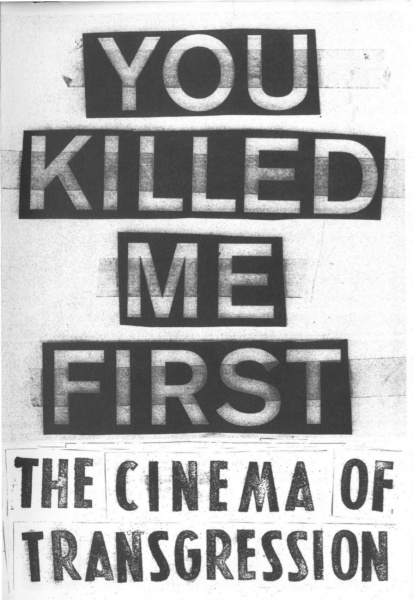You Killed Me First: The Cinema of Transgression (2012) [English/German]
Filed under catalogue | Tags: · 1980s, art, cinema, experimental film, film, horror, humour, sex, violence

“Basically, in one sentence, give us the definition of the ‘Cinema of Transgression’.” Nick Zedd: “Fuck you.”
Nightmarish scenarios of violence, dramatic states of mind, and perverse sexual abysses – the films of the Cinema of Transgression that were consciously aimed at shock, provocation, and confrontation, bear witness to an extraordinary radicality. In the 1980s a group of filmmakers from the Lower East Side in New York went on a collision course with the conventions of American society. Transcending all moral or aesthetic boundaries, the low budget films reveal social hardship met with sociopolitical indifference. Sometimes shot with stolen camera equipment, the films contain strident analyses of life in the Lower East Side defined by criminality, brutality, drugs, AIDS, sex, and excess. The catalogue is published on the occasion of the worldwide first exhibition on the Cinema of Transgression, You Killed Me First at KW Institute of Contemporary Art in Berlin.
The catalogue includes contributions by Sylvère Lotringer, Carlo McCormick, Jonas Mekas, Susanne Pfeffer, Jack Sargeant, Nick Zedd and collages by Leonard Neumann LSD.
Edited by Susanne Pfeffer
Publisher KW Institute of Contemporary Art, Berlin, and Walther Koenig, Cologne, 2012
ISBN 3863351576
176 pages
Video from exhibition (3 min)
PDF (110 MB, no OCR, updated on 2016-12-23)
Comment (0)Susie Linfield: The Cruel Radiance: Photography and Political Violence (2010)
Filed under book | Tags: · history of photography, image, journalism, photography, violence

“In The Cruel Radiance, Susie Linfield challenges the idea that photographs of political violence exploit their subjects and pander to the voyeuristic tendencies of their viewers. Instead she argues passionately that looking at such images—and learning to see the people in them—is an ethically and politically necessary act that connects us to our modern history of violence and probes the human capacity for cruelty. Grappling with critics from Walter Benjamin and Bertolt Brecht to Susan Sontag and the postmoderns—and analyzing photographs from such events as the Holocaust, China’s Cultural Revolution, and recent terrorist acts—Linfield explores the complex connection between photojournalism and the rise of human rights ideals. In the book’s concluding section, she examines the indispensable work of Robert Capa, James Nachtwey, and Gilles Peress and asks how photography should respond to the increasingly nihilistic trajectory of modern warfare.”
Publisher University of Chicago Press, 2010
ISBN 0226482529, 9780226482521
344 pages
review (Frances Richard, The Nation)
review (Sean O’Hagan, The Guardian)
PDF, PDF (updated on 2014-12-7)
Comments (5)Charles Tilly: Regimes and Repertoires (2006)
Filed under book | Tags: · activism, democracy, politics, revolution, social movements, violence

The means by which people protest—that is, their repertoires of contention—vary radically from one political regime to the next. Highly capable undemocratic regimes such as China’s show no visible signs of popular social movements, yet produce many citizen protests against arbitrary, predatory government. Less effective and undemocratic governments like the Sudan’s, meanwhile, often experience regional insurgencies and even civil wars. In Regimes and Repertoires, Charles Tilly offers a fascinating and wide-ranging case-by-case study of various types of government and the equally various styles of protests they foster.
Using examples drawn from many areas—G8 summit and anti-globalization protests, Hindu activism in 1980s India, nineteenth-century English Chartists organizing on behalf of workers’ rights, the revolutions of 1848, and civil wars in Angola, Chechnya, and Kosovo—Tilly masterfully shows that such episodes of contentious politics unfold like loosely scripted theater. Along the way, Tilly also brings forth powerful tools to sort out the reasons why certain political regimes vary and change, how the people living under them make claims on their government, and what connections can be drawn between regime change and the character of contentious politics.
Publisher University of Chicago Press, 2006
ISBN 0226803503, 9780226803500
266 pages
review (Tim Lacy, H-Net)
review (Adham Saouli, Political Studies Review)

